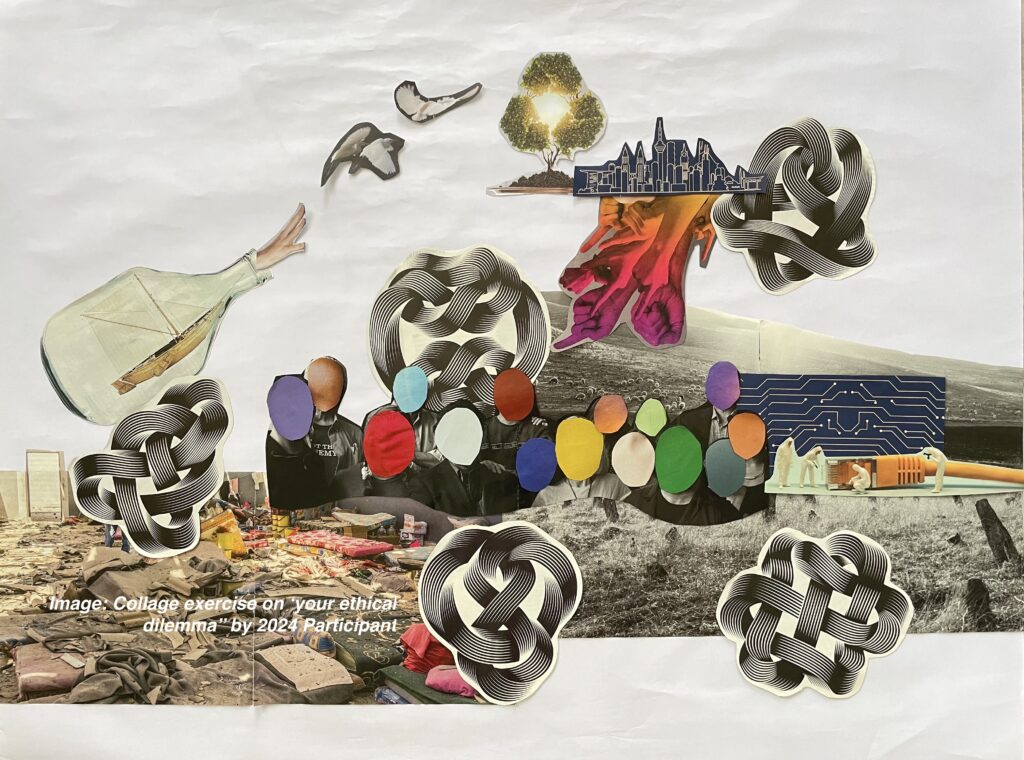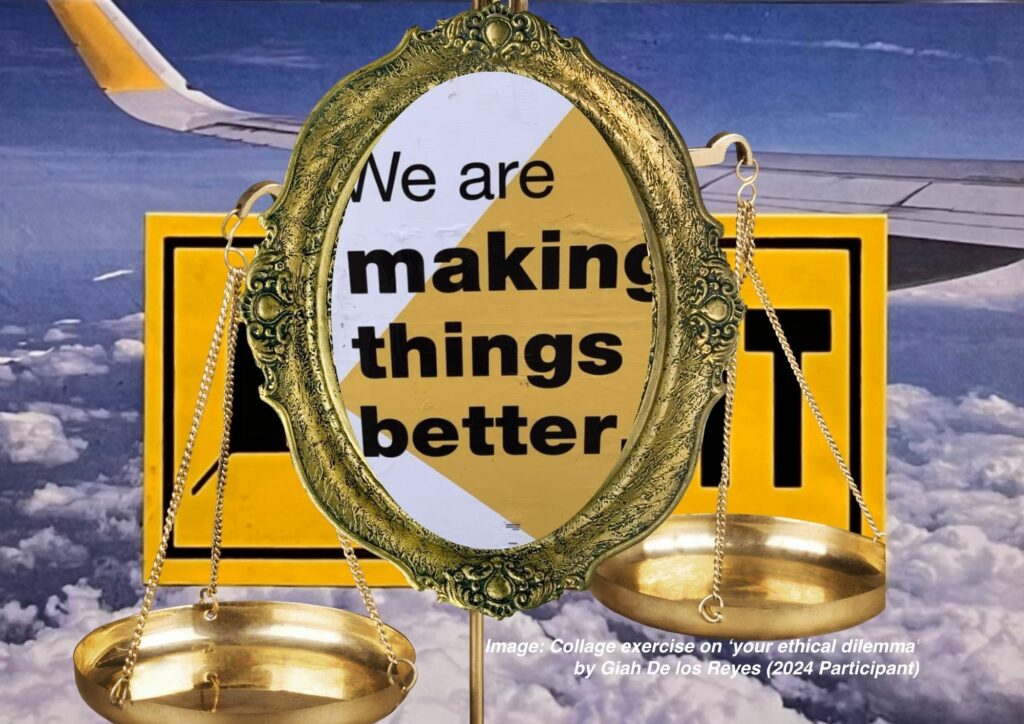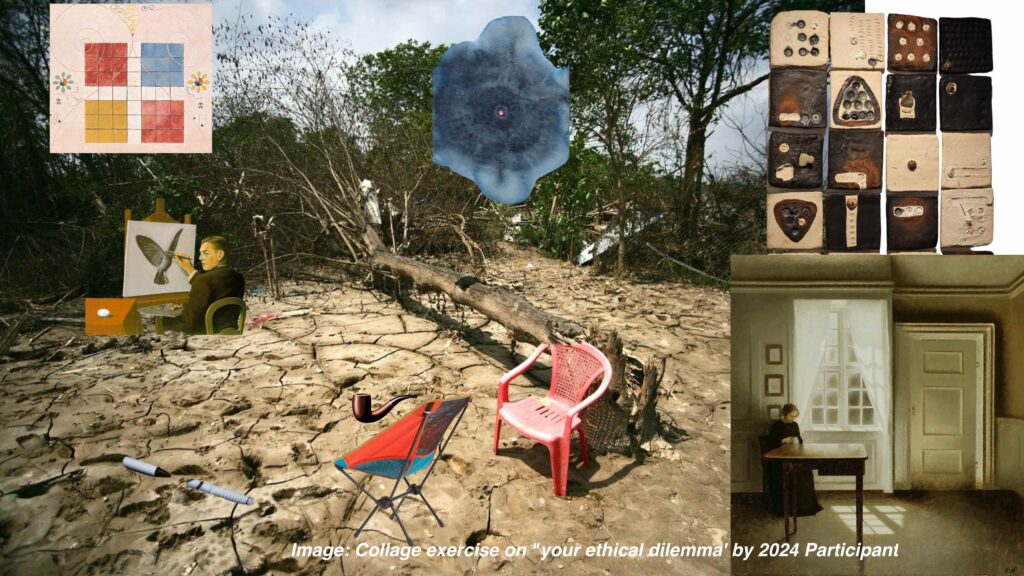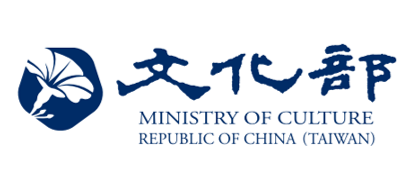2025 Learning Workshop: Ethical Dilemmas in Arts Practice



About the program
The learning workshop will be a series of conversations guided by Deirdre Prins-Solani, a practitioner with rich experiences in working with ethical issues in the arts and culture field.
Participants will come:
- prepared to share experiences of dealing with ethical dilemmas in arts practice,
- open to open-ended and generative conversations,
- keen to listen and to support each other to gaining better understanding about ethical issues, ways of new thinking,
- wanting to seek better methods for decision-making and references from the learning workshop
Open call details
Application deadline: June 24th 2025
Click on the links below for details of:
There will be one 2-hour orientation and then four 3-hour weekly workshops over 4 weeks online. The sessions will include; presentations by the facilitator e.g. ‘what is ethics’ and ‘strategies to integrate ethics into your arts practice’; small group discussions on case studies and exchange individual experiences with the group; and plenary discussions supported and guided by the facilitator.
There will be an exercise or reading between each weekly workshop and it will take approximately 60 minutes to complete. The final weekly workshop will include sharing an action plan from participants about how they plan to integrate their learning into their practice after the workshop.
The facilitator will support the participants to use collage as a method to visually express and analyse contexts, experiences, feelings and thoughts as so much of what guides our ethical practice and behaviour are intertwined with these.
Between workshop 2 and workshop 4, participants can sign up for a one-to-one time to talk to the facilitator regarding their learning and any issues they want to focus and explore.
FEEDBACK FROM PAST PARTICIPANTS
In every session, we were grouped and invited to discuss ethical dilemmas—carefully constructed so no personal details were revealed. This structure gave us the space to examine each situation thoughtfully and revisit our own stories from different perspectives. It also created a safe environment to engage with others’ views and allowed me to step outside my own inner monologue. That practice helped me gain valuable insights and taught me to consider other people’s experiences more deeply in similar situations.
Participant, 2024
I just want to say—you’re not alone. Sometimes it may feel like you’re pioneering something on your own, doing all the heavy lifting, and it can get overwhelming. But once you find your community—like I found Mekong Cultural Hub—things begin to feel lighter. From there, everything can only get better.
Participant, 2024
ABOUT THE FACILITATOR
As mentioned above, this guided Learning Workshop will be delivered by an experienced practitioner Deirdre Prins-Solani, she has expertise in cultural heritage and creative industries with practice focusing on capacity building for art sectors, inclusion and wellbeing.
Deirdre Prins-Solani is based in Cape Town, South Africa. She is a closet poet, dabbler in visual arts and avid reader. She has worked in museums, world heritage and professional capacity building in the cultural sector for more than two decades. She is a UNESCO facilitator in intangible cultural heritage (ICH or living heritage). She serves as a committee member of the ICH subcommittee for the Association of Critical Heritage Studies. She has conducted training and policy advisory services across the African continent, the Caribbean and the Asia-Pacific.
Deirdre is invited to lead the learning workshop by MCH and the workshop will be supported by MCH team, including Jennifer LEE, Program Manager and Frances Rudgard, Director.
Deirdre has run several workshops with Living Arts International (including MCH) on Embedding Ethical Practices throughout 2022. She also facilitated The MCH “Learning Workshop – Guided conversational learning about ethical dilemmas in arts practice” in 2023 and 2024. Deirdre is working with MCH to produce a publication of case studies on ethics in arts practice, which will be released in 2026.
PARTICIPANTS
Yipei
Taipei & Shanghai
Linh Trang Dao
Hanoi
Salyna
Luang prabang
Angela Josette Sonico
Antipolo City
Lutfiah Setyo
Jakarta/Surabaya
Mai
Hanoi
Frequently Asked Questions:
On May 20th, we held an Q&A session on zoom, where people joined and asked questions to MCH and the facilitator Deirdre about the program, the methods they will learn, and the application process. The questions and answers that were shared during the session are listed below. We also heard some very generous sharing from the participants of the online QA session regarding how they find the topic related to them. We think it’s worthy to share with you as well.
Will the workshop be studying some theories of ethics?
It will bring in some tools, guidelines and concepts from some research and theory. Those tools or concepts will be taken and used if they are relatable to the contexts of the participants’ dilemmas.
Will the workshop discuss ethical dilemmas in a practical way?
The Facilitator will consider what ethical dilemmas the selected participants have encountered in their work and to support the participants to generate their own theory/ways in taking actions and making decisions in their work. It is not a workshop to provide answers for ethical dilemmas but tools / ways we can practice and to apply in our work in consideration of contexts and culture we are in.
Who are the targeted participants? For example, I am not an artist but an educator who also works with arts? Am I eligible?
An educator working with arts from Asia is eligible to apply.
The targeted participants are individual arts practitioners or individuals working in arts organizations, whose work is also their social action to bring positive changes for the community or society. They can be artists, organizers, managers, producers, curators, researchers, educators, facilitators, granters, promoters and so on. They can be in different roles in different practices of arts.
I am not sure my work and background meet the criteria. Should I just apply?
If you are interested in applying but not sure if your role or practice meets the criteria, we welcome you to contact us via email: jennifer@mekongculturalhub.org.
We also encourage you to apply and explain more details in the application form.
Are we going to discuss our own dilemmas or some specific dilemmas?
The workshop takes participants and their dilemmas as center. The Facilitator will support the participants to collectively create a safe space for open discussion about the ethical dilemmas they are currently encountering or have faced in their arts practice. The Facilitator might bring in some other relevant cases if those will be helpful for discussion.
We will share our dilemmas in the application form and later in the workshop but I am not sure if I should reveal the related information of others?
The workshop aims to support practitioners who have actual experiences facing ethical dilemmas, so the actual experiences can be re-visited, analyzed, or reflected with the support of the facilitator and the group. In the application form or in the workshop, we suggest the actual information like the name of the people, organization or locations, all should be anonymous, protecting confidentiality and also giving some space between personal difficult feelings and understanding/empathy for different aspects of others.
Sharing from participants of the QA session:
Participant 1:
The participant 1 had read the documents of Open Call and now he listened to MCH’s presentation and shared why MCH does the workshop. He looked back to own experiences working in arts, maybe also due to the country he’s from has very complex situations including conflicts over decades, working in arts with community already becoming a complex situation. How we can consider our behaviors or decisions, sometimes is not just about right or wrong but beyond we can define what we encountered. In his context, in the unstable and conflicting society, many people are traumatized with unresolved challenging issues, everything becomes an even more complicated dilemma. For example, he thinks of when working with marginalized communities, how people from outside of the communities should be ethically considerate in their work of representing the communities?
However, he thinks even arts practitioners working on their social actions and working with the community in different contexts, will resonate with all the dilemmas. In his network, he finds the workshop will be relevant to his peers and he will share the chance with his networks.
(This is a short summary of what the participant shared, not exactly his original words.)
Participant 2:
“I just want to say thank you for organizing this session, it’s very helpful in the sense that it helps me get an overview of MCH as well as the program. Currently, I don’t have any questions in relation to the program itself, I just want to share some thoughts. I like Deirdre’s idea of putting ethics at the heart of arts practice, and I agree. I think ethics is important yet too obvious that we tend to take it for granted. The simple question, like “what if my project with good intentions turns out to be a bad consequence for the group/ community that I work with?” should be borne in mind. I just want to share some thoughts on top of my head and (I’m) really excited to apply!”
(This is quoted from another participant shared via chatbox of the QA session, which made other participants of the QA session feel very resonated.)
OTHER TRAINING PROGRAMS
2025 Learning Workshop: Ethical Dilemmas in Arts Practice
2025 TRAINING PROGRAM: Psychological First Aid
2024 Learning Workshop: Ethical Dilemmas in Arts Practice
2024 TRAINING PROGRAM: Psychological First Aid
Proposal Development (July 2023)
Psychological First Aid (September 2023)
Ethical Dilemmas in Arts Practice 2023
PARTNERS & SUPPORTERS
This program is possible thanks to the support of organisations and individuals including:
